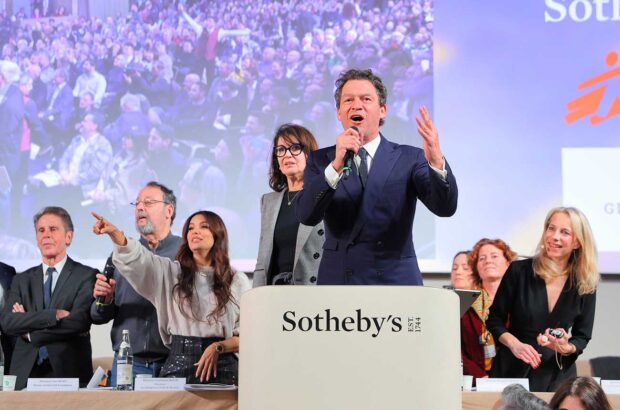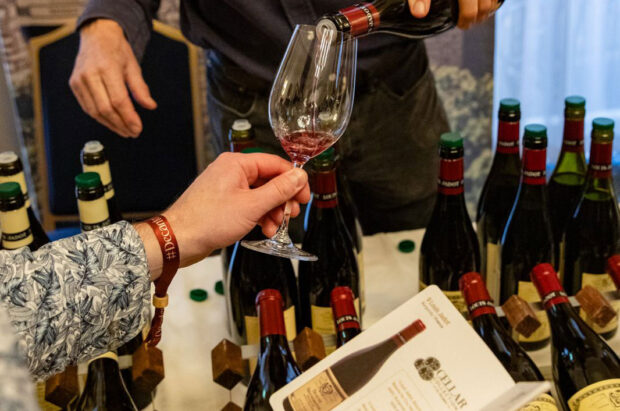The first part of this article attempted to tackle the timeline of events that led to Propeller’s collapse into liquidation.
This ranged from suppliers (and occasionally, staff) beginning to go unpaid from mid-to-late 2023 onwards, the freezing of its warehouse account by London City Bond, and two failed deals aimed at saving the company in late 2023 and early 2024.
However, while it could be argued that Propeller failed due to unfortunate circumstances, Decanter‘s research would suggest that the reasons for the company’s collapse were evident right from the start.
An established pattern
One former employee, who spoke on the condition of anonymity, worked on a freelance basis for Propeller between 2021-2022. We refer to them here as ‘Sam’.
Sam recalled that Propeller founder Jamie Wynne-Griffiths ‘presents really well, and knows how to rattle off a sales spiel’.
‘However, when it came to working with him, I quickly realised he’s totally disorganised, scatterbrained, and has no semblance of planning things. There was no direction, he’s here, there and everywhere with ideas.’
From Sam’s recollections, the business appears to have had serious issues from as early as 2021. For example, Sam was not paid in October or November of that year.
Wynne-Griffiths was then caught driving under the influence that December, and was later sentenced to a 28 month driving ban.
The two invoices were eventually paid but both they and the drink-driving incident ‘should’ve been more of a red flag than it was’, said Sam.
By May of 2022 Sam’s growing unease was at its height. ‘I said I didn’t like the cash flow issues even though sales were coming in and out of the business,’ they said.
‘He [Wynne-Griffiths] said not to worry and I was going to get a raise. But then I invoiced him for May and he couldn’t pay it. Then he didn’t pay for June or July. Then he went on holiday for three weeks to Greece.’
Unpaid work
During this time, Sam was left to shoulder the complaints from suppliers who were also going unpaid.
It is also alleged that, around this time, the company accountant approached Sam and said that Wynne-Griffiths was using company money to pay for personal expenses such as work on his house.
A series of text exchanges dating from late August show Wynne-Griffiths making a litany of excuses and promises around the late payments.
Wynne-Griffiths reiterated that all was going to get better. There was the invoice financing that ‘will change our cashflow overnight’, the inheritance from the sale of his late mother’s house, a Crowdcube campaign ‘at £90K’, ‘about £10K of new monthly retainers’, a ‘motherload of cash due this week’ from suppliers and ‘the new invoice cycle for Sept’.
‘Please don’t think I’m taking advantage of you,’ he said.
Trust erosion
By 3 October – now five months in arrears – promises and excuses were on-going. The invoice financing had yielded just £16,000 not a hoped-for £50,000. Wynne-Griffiths admitted he was ‘on stop with LCB’ over unpaid duty (proof that this had happened before the meltdown in 2023).
He said there was ‘£100K of committed funding’ from a Crowdcube campaign – though the only evidence Decanter has found of a campaign dates to 7 October 2022 and shows a little under £11,000 raised – as well as a ‘trade finance facility for £100K’ and £75K of inheritance.
Seven days later (10 October), Wynne-Griffiths was pressed again when the money owed would be forthcoming, with Sam threatening to file a claim if they were not paid.
He responded: ‘Jesus, why does it need to descend into this kind of aggression? There are no spare funds, account is overdrawn, and payroll has not been completed, nor have expenses. Although you had perfectly good reason to, bear in mind that you’ve left me and Jo [the accountant] to cover everything, not least the crowdfunding campaign.’
Sam replied: ‘I am done with excuses. I don’t believe anything you say anymore. The trust is gone.’
Wynne-Griffiths eventually paid in October and then pursued Sam to continue to work. At this point, Sam flat-out refused to work with him anymore.
Wynne-Griffiths replied that, ‘you have let this disagreement affect our commercial relationships with retailers and wholesalers, and that is simply unfair on everyone’.
Sam added that they felt ‘exploited’ by Wynne-Griffiths.
Too much wine
Adrian Moeckell is managing director of EWGA Wines in Lancashire. He worked with Wynne-Griffiths when Propeller launched.
When Wynne-Griffiths approached him with his business model and inquired about EWGA’s bonded facilities, Moeckell agreed to handle the logistics, storage and distribution side.
Moeckell told Decanter: ‘The original concept was ok. He would go out and find an importer like us and develop a range he would then hand over after 12 months.’
However, it quickly became apparent that this was not what was happening.
‘He wasn’t doing any of that and he wasn’t actually doing any selling. In the first year or two, the only place he was selling was to us and a few others – no more than about five people and they were only selling small amounts,’ Moeckell said.
‘We got to a point after a while where he was bringing in more and more wine and I was asking how he was going to sell it.’
The sheer volume of wine being brought in began to prove concerning. ‘There were wines that, at any price, we wouldn’t have sold. Poor quality, poor presentation etc,’ said Moeckell.
At one point, Wynne-Griffiths had amassed 10 pallets-worth of a wine from Gaillac in EWGA’s warehouse – an extraordinary amount for a French region with a tiny footprint in the UK and which, unsurprisingly, sold slowly.
Selling the concept
In Moeckell’s view, Wynne-Griffiths was more interested in chasing clients for the sign-up fee than selling their product.
‘It really was a case of: “I’ll take anybody on if they’ll pay me”,’ he said. ‘The whole thing stank, that’s the truth. We could see the point coming where he went bust.’
Eventually the relationship soured. ‘We insisted that wine on consignment was held in the ownership of the wineries, which is why we fell out with him. He didn’t like that idea,’ said Moeckell.
Furthermore, he was ‘months behind paying us for storage. And it kept growing because he kept bringing in more wines’.
EWGA broke off its association in early 2022 and Wynne-Griffiths paid his bills before moving the stock to LCB.
Ultimately, in Moeckell’s view, Wynne-Griffiths was, ‘unable to provide the service he was selling. He wanted to sell the concept of Propeller, not the wines.’
Unanswered questions
There remain serious questions around the actions of Wynne-Griffiths during the running of Propeller.
It is now clear the company had issues paying its employees, suppliers and warehousing providers over the course of 2021-2022, and that this continued into a chronic state by the end of 2023.
During much of this time, Wynne-Griffiths continued to sign-on new suppliers that he does not appear to have had the capacity to properly represent.
Despite his previous assertion that monthly fees were ‘negligible’, it is apparent from the previously quoted text exchanges that they were vital to monthly cash flow.
As Sam said, there came a point where: ‘He was saying yes to stuff that made no sense.’ While there is Moeckell’s contention that he simply took on anyone who paid.
While the portfolio may have achieved a ‘critical mass’ in terms of volume, it had no coherency, no USP, was stacked with risky or hard-to-sell wines listed on unrealistic grounds in quantities that were far too large, and never had the staff required to sell high volumes.
Wynne-Griffiths has no clear reason why he failed to secure a sales rep for the important Greater London market, despite promising suppliers one would be. He explained to Decanter that three people were appointed over a 12- to 18-month period but none proved satisfactory and were let go.
After that he said he handled London sales ‘as best I could’, a job which would have been very difficult to do properly given his drink-driving ban.
Where did the money go?
It is, at this stage, near-impossible to know the state of Propeller’s finances but Wynne-Griffiths claims as much as £275,000 was due to come good from various sources in late 2022.
And yet, staff and suppliers frequently went unpaid for extended periods.
In his discussions with Decanter, Wynne-Griffiths frequently stated that ‘lack of underlying cash’ was an issue, that taking on such esoteric wines ‘without a capital base’ was a ‘foolhardy’ thing to do.
But, in the latter half of 2023, with cashflow becoming, in his words, ‘creakier and creakier’, and suppliers going unpaid, why did he decide to open a shop (and later a bar) with all of its associated overheads?
And on at least two occasions when in serious arrears, Wynne-Griffiths went off on lengthy family holidays; once to Greece in the summer of 2022 and then to Thailand in the winter of 2023.
Tailspin
In both messages Decanter has seen and in conversation, a theme of Wynne-Griffiths’ excuses is his deflection and redirection of blame for all that went wrong.
‘There’s been no input from producers I’m having to pay storage on,’ he told Decanter in one conversation. ‘We hit a buffer and they stopped paying us.’
In an email to a supplier he wrote: ‘You were all perfectly entitled to stop paying us, however we were nonetheless obliged to continue storing your stock for well over a year without any payment.’
Or there is the text he sent to Sam during the pay dispute, quoted previously, in which he attempts to make them feel guilty for not doing more around the crowdfunding.
In none of the above instances does Wynne-Griffiths show any awareness that it was his failure to recompense suppliers and employees properly that led to them withholding further work or payment themselves.
Likewise, there was his claim that he had appointed insolvency experts Purnells to liquidate the company but was forced into the winding-up order by an impatient former supplier.
Acting for the former supplier, Griffin Law had intended to serve the order back in the spring of 2024 but held back when it heard Wynne-Griffiths had appointed liquidation firm Purnells.
But after nearly two months of no further updates, Purnells confirmed that it had received no further instructions on how to proceed from Wynne-Griffiths.
During this time, he continued to pay for wines to be released from his frozen account and then sold them through the shop – or tried to auction them off – never telling the suppliers what he was doing with their stock; stock – furthermore – that on the basis of his own business model he does not own.
Paper aeroplane
Slick presentations and sales patter kept Propeller aloft for a time, giving the impression it was more solidly built than it was, but, in the end, they merely masked a paper aeroplane fluttering ever earthwards.
The list of creditors is long. Out-of-pocket suppliers and investors are certain to take second-billing to three business finance companies and HMRC as the company goes into liquidation.
The chances of most producers reclaiming even a fraction of what they are owed is slim. Wynne-Griffiths’ claim to Decanter that he is in the process of setting up new companies and is ‘looking into a recovery fund’ in order to ‘make incremental steps into paying [out of pocket producers] over time’, appears wishful thinking at best.
Meanwhile, Wynne-Griffiths is likely to face further scrutiny over his company finances. Trading while insolvent or wrongfully trading – continuing to trade beyond the point of recovery, taking delivery of goods you cannot pay for, amassing debts to your creditors’ detriment etc – is a civil offence.
At the very least, the competence and integrity of Wynne-Griffiths has to be called into question, he has done immense harm to both employees, suppliers and investors – many of them small producers – that fell into his orbit.
Donal Blaney, principal of Griffin Law told Decanter that Wynne-Griffiths was entirely mistaken if he thought he could hide behind limited liability to escape responsibility for his failings. He is also unlikely to escape further press scrutiny in future.







